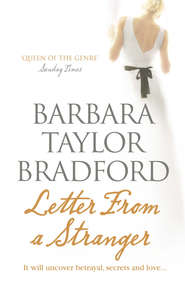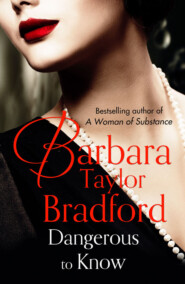По всем вопросам обращайтесь на: info@litportal.ru
(©) 2003-2025.
✖
Act of Will
Автор
Год написания книги
2019
Настройки чтения
Размер шрифта
Высота строк
Поля
When the music stopped he thanked her politely, escorted her back to the bench, inclined his head, strolled off.
Her eyes followed him all the way to the front door. And as he walked out into the dark winter night she wondered who he was and if she would ever see him again. She desperately hoped she would.
Later when she and Gwen were hurrying up Town Street, making their way back to Calpher House, Gwen suddenly blurted out: ‘Well, I must say, for someone who protests they’re not interested in men, you were certainly mesmerized by that chap you had the last dance with. But I can tell you this, Audra, he’s bad news. Oh yes, definitely, lovey.’
Audra, startled, asked, ‘How can you say he’s bad news? You don’t even know him.’
Gwen took hold of Audra’s arm in her usual possessive way, slipped her own through it. She said, ‘I can tell just by looking at him that he’s a real devil. I’m always suspicious of the pretty ones. Very wary. They generally end up breaking some poor woman’s heart, lovey, maybe even two or three hearts, for that matter. You’d be much better off with somebody like our Charlie. And you know how he feels about you, lovey. He hasn’t changed.’
Audra said nothing. Gwen’s remarks about the young man irritated and annoyed her. She considered them to be unwarranted and just a shade preposterous under the circumstances. Presumptuous, in fact, and for the first time in their friendship she was put out with Gwen. The next morning, still rankling somewhat, Audra scrupulously avoided referring to the evening before, and she and Gwen did not discuss the young man again.
But Audra could not help thinking about him.
In the days which immediately followed the encounter, she kept recalling certain things about that night and about him…the way he had looked down at her, narrowly, speculatively, through the greenest eyes she had ever seen…the turbulent emotions he had aroused in her, feelings she had not believed really existed except in the novels on Mrs Bell’s shelves…his ineffable grace as he had moved them around the dance floor…the true classical beauty of his face, so unusual in a man.
Now, nearly two months afterwards, Audra was still asking herself why she never ran across him in Upper Armley. Ever since the dance she had expected to do so, and she looked for him when she went out and about with the child who was in her charge. She was convinced the young man came from these parts for she could recognize the local accent when she heard it.
As Audra focused her thoughts on him, an echo of his voice reverberated clearly in her head, and an image of his face leapt before her eyes. And despite the warmth of the quilt, she shivered unexpectedly and goose flesh speckled her skin. She wrapped her arms around her body, hugging herself. She pictured his face close to hers on the pillow, tried to imagine what it would be like to be kissed by him, touched by him, held by him. Since their brief encounter, the mysterious dark young man had haunted her, intruded on her thoughts at the oddest times.
Presently Audra opened her eyes and endeavoured to quench the unfamiliar longings stirring within her. Until she had met him, danced with him, Audra had never known sexual desire, and of late some of the strange, new feelings she was experiencing confused and frightened her, yet excited her at the same time. She pressed her face into the pillow, wanting to block out the memory of him, and discovered, as she had so often in the past few weeks, that she was unable to expunge the image of his face, his unbelievable eyes. She knew she wanted him.
Turning onto her back, she lay very still, staring up at the ceiling, her eyes wide, unblinking, and she wondered what she would do if she did not run into him again. Dismay gripped her, then instantly dissipated. Audra believed that they would meet and that they would come to know each other well. Very well indeed. She felt this in her bones.
A sudden clattering in the corridor outside her bedroom pierced the early morning silence. Audra started in surprise, then cocked her head, listened. She heard a stifled exclamation, then low unintelligible mutterings, followed by the sound of feet clomping into the adjoining day nursery.
Audra knew that it was Cora going about her morning chores. She suspected that the housemaid had dropped the coal scuttle, which was not an unusual occurrence by any means. Cora, who was perpetually cheerful, had turned out to be a friendly soul, but she was also the clumsiest person Audra had ever met. A day did not go by without a breakage of one kind or another, and the culprit, sadly, was always poor Cora.
There was a loud knock on the door and Cora’s scrubbed and shining face appeared around it. ‘Mornin’, Miss Audra.’
‘Good morning, Cora,’ Audra said, pushing herself up on one elbow, smiling in the half light.
‘Is it all right if I comes in then, Miss Audra? Ter make t’fire for yer?’
‘Yes, of course, Cora.’
Cora’s plump little body, encased in her pink-striped morning uniform, rotated across the room like a fastspinning top. She dumped the coal scuttle and the ashpan down on the hearth unceremoniously, then spun over to the huge window. Pulling back the curtains with a great flourish, flooding the room with brilliant sunshine, she exclaimed, ‘It’s ever so cold out this mornin’, Miss. Arctic weather, so Fipps says. Aye, he says it’s cold enough ter freeze t’balls off a brass monkey, that he does.’
‘Really, Cora!’
‘That’s what he said ter me, Miss.’
‘But you shouldn’t repeat something vulgar like that, Cora,’ Audra reprimanded softly.
‘No, I don’t expects I should, least ways not in yer presence, Miss Audra.’ This was said somewhat apologetically, but, nevertheless, Cora threw her a cheeky grin as she hurried back to the fireplace. Crouching in front of the grate, she proceeded to take out the ashes. After a short pause, she asked, ‘And what are yer doin’ termorra night then, Miss Audra?’
‘Nothing special, Cora. My friend Miss Thornton is on night duty at the Infirmary for the next two weeks, so I won’t be going to any New Year’s Eve parties. I’ll be staying here at Calpher House.’
‘Oh but Mr Agiter allus has a party for t’staff yer knows.’ Cora glanced over her shoulder, smiled with her usual engaging cheerfulness, added, ‘Yer were ever so shy last December, when yer first started here, and yer wouldn’t come downstairs, but I hopes yer’ll be with us this year, ooh I do, Miss Audra, ever so much.’
‘Yes, I will, Cora. Mr Agiter has already invited me, and I’m looking forward to joining you all for a glass of champagne around midnight…to toast in 1928.’
Audra had grown to love Theophilus, Theo for short, in the year she had been taking care of him.
He was an odd-looking little boy, not exactly plain, but then neither was he fancy.
The first time she had set eyes on him she decided that he was highly individualistic. This turned out to be true – and in many more ways than merely his appearance. Theophilus had a plump, perfectly round little face, not unlike a suet pudding, but his skin was pink and white rather than doughy or pasty in colour. His fair hair, soft, silky, straight, had a way of flopping down over two very sharply-observing black eyes that resembled bright little chips of coal, and he was forever pushing it away with an impatient gesture.
It often struck Audra that these very dark eyes and the pale blond hair didn’t quite go together, but then that was Theophilus. He seemed to be made up entirely of spare parts, each bit individually attractive if not specifically designed to go with the others.
‘Not matched up, are you, my little love?’ Audra murmured under her breath as she brushed his hair. His appearance usually preoccupied her for a few minutes before they went out, and this morning was no exception. She put the brush down, stepped away, regarded him critically, her head on one side. Reaching out, she straightened his tie, nodded in satisfaction, then bending over, she planted a kiss on his cheek.
‘There you are, all ready!’ she exclaimed, taking his hands in hers, helping him to jump down off the table. ‘And you’re as bright as a new penny today, Theo.’
He looked up at her through solemn eyes which were curiously wise and knowing for a six-year-old. ‘I hope the doctor also thinks that.’
She bit back a smile of amusement, said, ‘I’m sure he will. Now, run along to see your mother, whilst I get my things together, and then we can be off.’
‘Oh yes, I had better do that. Before she leaves for Leeds. My spending money is due today.’ He set his face determinedly, marched towards the door in small but purposeful strides and disappeared into the corridor.
Audra watched him go, turned away, laughing to herself as she crossed the spacious and comfortably furnished day nursery. She had a few minutes to spare before following the boy downstairs and she stood with her back to the fire, warming herself, thinking of her young charge.
Theophilus Bell never ceased to amaze and amuse Audra. He was a precocious child, although his precocity was not offensive. Cook said he was ‘old-fashioned’ and this description fitted him perfectly. Audra was not a bit surprised he was the way he was – so serious and self-possessed. He had spent most of his young life with adults; even his sisters were much older than he. Pandora, who had married in the spring and moved out of Calpher House, was twenty-two. Antonia and Felicity, both now attending finishing school in Switzerland, were nineteen and eighteen respectively; all three happened to be sophisticated young women who were well educated, well travelled and had been exposed to a variety of people and a great deal of radical thought in this house. And so they also were much older than their years and, not unnaturally, they had had an influence on their small brother. The girls called Theo ‘the afterthought’, and although Audra disliked this term, considered it to be rather unkind, she realized that there was a degree of truth in it. He had been born to Mrs Bell when she was forty-two, long after she had expected to bear any more children, and, as she had said to Audra, ‘Theo just missed being a change-of-life baby, thank heavens.’
Audra considered it a small miracle that the Bells had not fallen into the usual trap of pampering and spoiling Theo, which so often happened to an only son who came to his parents later in life and who was their pride and joy. He was indulged occasionally, but this seemed to have little or no effect on him, and he was not given to making excessive demands on anyone, nor was he a temperamental child.
In actuality, Theo was a lot like his mother. Certainly he had inherited Irène Bell’s quick-wittedness, her intelligence and her studious nature. And if he was sometimes unnerving in his forthrightness, he was, nevertheless, a good child, very obedient; he had never given Audra one moment’s trouble in the past twelve months.
Ten loud chimes, echoing through from the bedroom, suddenly alerted Audra to the hour. Theo had been suffering with a sore throat, and although he was better she was taking him to the doctor this morning for a check-up.
Hurrying through into the other room, she glanced at herself in the glass, smoothed one hand over her hair, newly bobbed that summer, then went to the wardrobe in the corner. She took out her heavy winter coat and hat, and a thick woollen scarf and gloves in anticipation of the Arctic weather which had apparently descended on them, just as the gardener had predicted it would yesterday.
CHAPTER 9 (#ulink_0aa9a86e-3bc6-5546-9c11-fa986ce543fd)
His name was Vincent Crowther and he was something of a rebel.
He was born in the year 1903, at five minutes to midnight on the twelfth day of June, in the middle of the worst thunderstorm the new century had witnessed.
A lusty, robust, nine-pound baby, he came screaming into the world, fists flailing, face red and contorted, and giving vent to such a fierce and angry display of temperament the doctor told the midwife that the baby’s tantrums were only out-matched by the violence of the weather outside.
His mother secretly called him her Stormy Petrel thereafter, and she was the least surprised of anyone when her rebellious child grew up to be an equally rebellious man, one who was a maverick, who always stood out in a crowd.
He was a natural star, one who drew others to him by sheer force of personality, dashing looks and more than his fair share of a most beguiling charm. Further, it did him no harm that he had what his father called ‘the gift of the gab’.
The first born of Eliza and Alfred Crowther’s eight children, Vincent boasted an almost feminine beauty as a child, but this turned into a masculine type of handsomeness as he matured to manhood. And there never was any question about his virility. It was like a gloss on him. In consequence, women fell at his feet swooning and they had done so since he was sixteen. He was well versed in their ways and in love and sex; he was master of these games at a very tender age, had broken many a heart. He was twenty-four. His looks dazzled.
It was his colouring that was so sensational. The gleaming black hair and the black brows were in marked contrast to a light, creamy complexion and cheeks that held a tinge of pink like the bloom on a peach; he had cool green eyes, the colour of light, clear tourmalines, fringed with thick black lashes. His eyes and his skin were the envy of his sisters – and most other women.
Matched to the striking colouring and handsome profile was a superb athletic body. He was exactly five feet nine and a half inches tall, well muscled, firm and taut and without one ounce of fat or flab on him.











